Are you dreaming of an authentic Vietnamese adventure? Discovering the availability of homestays in ethnic villages is your key to unlocking unforgettable cultural immersion. With SIXT.VN, planning your homestay experience in Vietnam is simplified with expert travel consultation. Let us help you explore Vietnam’s hidden gems, providing convenient airport transfers, comfortable hotel bookings, and curated tours so you can experience the real Vietnam stress-free. Consider SIXT.VN your premier partner for ethnic village homestays, cultural tours, and authentic travel experiences!
1. Discovering the Allure of Homestays in Vietnam’s Ethnic Villages
Are you curious about whether you can immerse yourself in the authentic culture of Vietnam by staying in homestays in ethnic villages? Absolutely, you can find homestays available in many ethnic villages throughout Vietnam, offering a unique and deeply personal travel experience. Homestays allow you to live alongside local families, share meals, and participate in daily activities, providing insights into their traditions and way of life that you simply cannot get from a hotel. Opting for homestays in ethnic villages not only gives you a chance to experience the local culture but also directly supports the community, fostering sustainable tourism.
The popularity of homestays in ethnic villages has increased in recent years as travelers seek more genuine and immersive experiences. According to the Vietnam National Administration of Tourism, cultural tourism, which includes homestays, has seen a 15-20% annual growth in the number of foreign visitors. Regions such as Sapa, Mai Chau, and the villages around Ha Giang are particularly well-known for offering such accommodations.
Choosing a homestay means you’re opting for a slower pace of travel, one where you can connect with people, learn about their customs, and contribute to the local economy. For instance, in Sapa, staying with a Hmong family allows you to learn about their traditional weaving techniques and farming practices. In Mai Chau, you can discover the unique culture of the White Thai people, known for their stilt houses and traditional dances. Each region offers its own distinct experiences, making homestays a gateway to understanding Vietnam’s rich cultural tapestry.
2. Where to Find Homestays in Vietnam’s Ethnic Villages
Where can you actually find these homestays that offer such an immersive experience? Homestays are primarily located in the northern mountainous regions and the central highlands of Vietnam, areas known for their diverse ethnic populations and vibrant cultures. These villages offer a range of homestay options, from basic accommodations to more comfortable setups with modern amenities, allowing you to choose based on your preferences and budget.
2.1 Popular Regions for Homestays
Here are some top regions where you can find authentic homestays:
- Sapa: Located in Lao Cai province, Sapa is famous for its stunning rice terraces and diverse ethnic groups, including the Hmong, Dao, and Tay. Homestays here often involve participating in farming activities and learning about traditional crafts.
- Mai Chau: Situated in Hoa Binh province, Mai Chau is known for its peaceful valley and the White Thai ethnic group. Homestays in Mai Chau offer a chance to explore the local culture through traditional music performances and local cuisine.
- Ha Giang: The northernmost province of Vietnam, Ha Giang, boasts dramatic landscapes and is home to various ethnic minorities such as the Hmong, Tay, and Lo Lo. Homestays in Ha Giang provide an opportunity to trek through remote areas and experience untouched cultures.
- Bac Ha: Known for its vibrant Sunday market, Bac Ha in Lao Cai province is another excellent location for homestays. Here, you can interact with the Flower Hmong people and witness their unique trading traditions.
- Pu Luong: This nature reserve in Thanh Hoa province offers a more off-the-beaten-path experience. Homestays in Pu Luong are perfect for nature lovers, with opportunities for hiking, exploring caves, and learning about local agriculture.
2.2 How to Find and Book Homestays
Finding and booking a homestay is now easier than ever, thanks to the internet. Here are some methods to help you secure your spot:
- Online Travel Agencies (OTAs): Websites like Booking.com, Airbnb, and Agoda offer listings of homestays in various ethnic villages. These platforms provide reviews and ratings, helping you make informed decisions.
- Local Tour Operators: Companies specializing in responsible and sustainable tourism often have partnerships with local homestays. Booking through these operators ensures that your money directly benefits the community. SIXT.VN is a great example.
- Direct Contact: In some cases, you can find homestays through blogs and forums, which may provide direct contact information for the homestay owners. This allows for a more personal connection and the possibility of negotiating prices.
2.3 What to Expect in a Homestay
Homestays in ethnic villages typically offer:
- Basic Accommodations: Expect clean and simple rooms, often with a mattress on the floor and mosquito nets. Some homestays offer private rooms, while others provide dormitory-style setups.
- Home-Cooked Meals: One of the highlights of staying in a homestay is the food. You’ll enjoy traditional dishes made with fresh, local ingredients. Be prepared to eat what the family eats and try new flavors.
- Cultural Activities: Many homestays offer activities such as trekking, farming, cooking classes, and traditional music performances. These activities provide hands-on experience with the local culture.
- Interaction with Locals: The most rewarding aspect of a homestay is the opportunity to connect with the family and other villagers. Engage in conversations, ask questions, and be respectful of their customs.
3. Preparing for Your Homestay Experience in Vietnam
Are you wondering how to prepare for your homestay adventure to ensure you respect the local culture and customs? Preparing well for your homestay adventure is crucial to ensure a respectful and enriching experience for both you and your hosts. Embracing cultural sensitivity, packing appropriately, and understanding basic etiquette will pave the way for a memorable and meaningful stay.
3.1 Cultural Sensitivity
When staying in an ethnic village, it’s important to be mindful and respectful of local customs and traditions. The cultures in these villages have been preserved for generations, and it’s your responsibility as a guest to honor them. Here are some ways to demonstrate cultural sensitivity:
- Dress Modestly: When visiting religious sites or participating in community events, dress modestly. Avoid wearing revealing clothing and opt for attire that covers your shoulders and knees.
- Ask Permission Before Taking Photos: Always ask for permission before taking photos of people, especially elders. Some communities may have beliefs about photography affecting their spirit or luck.
- Respect Sacred Sites: If you visit temples, shrines, or other sacred sites, remove your shoes and hat. Maintain a quiet and respectful demeanor.
- Learn Basic Phrases: Learning a few basic phrases in the local language can go a long way in showing respect and building connections. Simple greetings like “hello” (xin chào) and “thank you” (cảm ơn) are always appreciated.
- Participate in Activities: Show genuine interest in the daily lives of your hosts. Offer to help with chores, participate in traditional crafts, or join in local celebrations.
- Be Mindful of Gestures: Be aware of your body language. Avoid pointing your feet at people, as this is considered disrespectful in many Asian cultures. Use both hands when giving or receiving items.
- Respect Mealtime Etiquette: Meals are an important part of daily life. Eat with your right hand, and avoid sticking your chopsticks upright in your rice bowl, as this resembles a funeral offering.
- Avoid Public Displays of Affection: Public displays of affection, such as kissing and hugging, may be frowned upon in some communities.
3.2 What to Pack
Packing the right items can make your homestay experience more comfortable and enjoyable. Here’s a list of essentials to consider:
- Comfortable Clothing: Pack lightweight, breathable clothing suitable for the local climate. Include layers for cooler evenings and early mornings.
- Sturdy Shoes: If you plan on trekking or hiking, bring sturdy, comfortable shoes with good traction.
- Rain Gear: Depending on the season, pack a raincoat or waterproof jacket and umbrella.
- Insect Repellent: Mosquitoes and other insects can be prevalent, especially in rural areas. Bring a reliable insect repellent to protect yourself from bites.
- Sunscreen and Hat: Protect yourself from the sun with sunscreen, a wide-brimmed hat, and sunglasses.
- First-Aid Kit: Pack a small first-aid kit with essentials like band-aids, antiseptic wipes, pain relievers, and any personal medications.
- Toiletries: Bring your own toiletries, including soap, shampoo, toothbrush, and toothpaste. While some homestays may provide basic amenities, it’s best to be self-sufficient.
- Flashlight: A flashlight or headlamp can be useful for navigating around the village at night, as street lighting may be limited.
- Power Adapter: Vietnam uses Type A and Type C power outlets, so bring a universal power adapter if needed.
- Gifts for Your Hosts: Consider bringing small gifts for your hosts as a token of appreciation. Items like tea, coffee, or small crafts from your home country are always well-received.
- Translation App: A translation app on your smartphone can be invaluable for communicating with locals who may not speak English.
3.3 Health and Safety
Your health and safety are paramount. Before embarking on your homestay adventure, consider the following:
- Consult Your Doctor: Schedule a visit to your doctor to discuss necessary vaccinations and health precautions for traveling to Vietnam.
- Travel Insurance: Purchase comprehensive travel insurance that covers medical emergencies, trip cancellations, and loss of belongings.
- Food and Water Safety: Drink bottled or purified water to avoid waterborne illnesses. Be cautious of street food and ensure that meals are prepared in a clean and hygienic manner.
- Personal Safety: Be aware of your surroundings and take precautions to protect yourself from theft or scams. Keep your valuables secure and avoid walking alone at night.
- Emergency Contacts: Carry a list of emergency contacts, including your embassy or consulate, local police, and your travel insurance provider.
4. What to Expect During Your Stay: Embracing Authentic Living
Are you curious about what a typical day looks like when you stay in an ethnic village homestay? Staying in a homestay offers a unique window into the daily lives of the local people. Embrace this opportunity to participate in their routines, learn about their traditions, and connect with them on a personal level. From the food you eat to the activities you participate in, expect an authentic and immersive experience.
4.1 Daily Routines and Activities
Daily life in an ethnic village revolves around agriculture, crafts, and family. Here’s what you might experience:
- Morning:
- Wake up early to the sounds of the village – roosters crowing, children playing, and farmers heading to the fields.
- Participate in morning chores, such as feeding animals, watering plants, or preparing breakfast.
- Enjoy a traditional breakfast with your host family, which might include rice porridge, noodles, or local pastries.
- Daytime:
- Join your hosts in their daily work, whether it’s tending to rice paddies, weaving textiles, or crafting traditional tools.
- Take part in cultural activities, such as learning traditional dances, playing local games, or visiting nearby attractions.
- Explore the village and its surroundings, interacting with other villagers and learning about their way of life.
- Evening:
- Help prepare dinner with your host family, learning about local ingredients and cooking techniques.
- Share a meal with the family, engaging in conversation and learning about their stories and traditions.
- Participate in evening activities, such as traditional music performances, storytelling, or games.
- Enjoy the peaceful ambiance of the village, far from the hustle and bustle of city life.
4.2 Food and Dining
Food is an integral part of the homestay experience. You’ll have the opportunity to savor traditional dishes made with fresh, local ingredients. Here are some things to keep in mind:
- Local Cuisine: Be prepared to try new and unfamiliar dishes. Local cuisine often features rice, vegetables, herbs, and meats, prepared using traditional techniques.
- Sharing Meals: Meals are typically shared with the family, providing an opportunity to bond and learn about their culture.
- Dietary Restrictions: If you have any dietary restrictions or allergies, inform your hosts in advance so they can accommodate your needs.
- Mealtime Etiquette: Observe proper mealtime etiquette, such as waiting for everyone to be served before starting to eat, using your right hand to eat, and avoiding wasting food.
4.3 Interacting with Your Hosts
Building a genuine connection with your hosts is key to a meaningful homestay experience. Here are some tips for interacting with your hosts:
- Be Respectful: Treat your hosts with respect and courtesy. Show interest in their lives and culture, and be mindful of their customs and traditions.
- Engage in Conversation: Engage in conversation with your hosts, asking questions about their lives, culture, and history.
- Offer Help: Offer to help with chores or other tasks around the house. This shows your willingness to participate in their daily lives.
- Show Appreciation: Express your gratitude for their hospitality and kindness. A simple “thank you” can go a long way.
- Share Your Culture: Share stories about your own life and culture. This allows for a two-way exchange of knowledge and understanding.
- Be Patient: Communication may be challenging due to language barriers, but be patient and persistent. Use gestures, translation apps, or seek help from other villagers to bridge the gap.
5. Ethical Considerations: Responsible Homestay Practices
Are you concerned about ensuring your homestay experience supports the local community in a responsible way? Engaging in ethical homestay practices ensures that your visit benefits the local community, preserves their culture, and protects the environment. Supporting local economies, respecting cultural traditions, and minimizing your environmental impact are key aspects of responsible tourism.
5.1 Supporting Local Economies
One of the primary goals of ethical homestays is to support local economies. Here are some ways to ensure your visit contributes positively:
- Book Directly: When possible, book your homestay directly with the local community or through responsible tour operators that prioritize community benefits.
- Purchase Local Products: Buy souvenirs, crafts, and other products directly from local artisans and vendors. This ensures that your money goes directly to the people who created them.
- Eat at Local Restaurants: Dine at local eateries and food stalls to support small businesses and savor authentic cuisine.
- Hire Local Guides: If you need a guide, hire a local person who is knowledgeable about the area and its culture.
- Tip Generously: Tip your hosts and other service providers generously to show your appreciation for their hospitality.
5.2 Respecting Cultural Traditions
Preserving and respecting local culture is another essential aspect of ethical homestays. Here are some guidelines to follow:
- Learn About Local Customs: Before your visit, research the customs, traditions, and etiquette of the local community.
- Dress Modestly: Dress modestly and appropriately, especially when visiting religious sites or participating in cultural events.
- Ask Permission: Always ask for permission before taking photos of people or their property.
- Participate Respectfully: Participate in cultural activities respectfully, showing genuine interest and appreciation.
- Avoid Disruptive Behavior: Avoid behaviors that may disrupt the peace or offend the locals, such as excessive noise or public displays of affection.
5.3 Environmental Impact
Minimizing your environmental impact is crucial for sustainable tourism. Here are some ways to reduce your footprint:
- Reduce Waste: Minimize your use of disposable plastics, such as water bottles and shopping bags. Bring reusable alternatives whenever possible.
- Conserve Water: Conserve water by taking shorter showers and turning off the tap when not in use.
- Save Energy: Save energy by turning off lights and appliances when you leave your room.
- Respect Nature: Respect nature by avoiding littering, staying on designated trails, and not disturbing wildlife.
- Support Eco-Friendly Practices: Support homestays and businesses that prioritize environmental sustainability, such as those that use renewable energy, practice waste reduction, and promote conservation.
6. Overcoming Challenges: Language Barriers and Cultural Differences
Are you worried about potential communication issues when staying in a homestay with limited English speakers? Language barriers and cultural differences can present challenges, but they can also be opportunities for growth and connection. Approaching these challenges with patience, flexibility, and a willingness to learn can lead to rewarding and enriching experiences.
6.1 Language Barriers
Communicating with your hosts when there is a language barrier can be challenging, but there are several strategies you can use to bridge the gap:
- Learn Basic Phrases: Learn a few basic phrases in the local language, such as greetings, thank you, and basic requests.
- Use Translation Apps: Utilize translation apps on your smartphone to translate spoken or written words.
- Use Gestures: Use gestures and body language to communicate your needs and ideas.
- Ask for Help: Ask other villagers or your tour guide to help translate if needed.
- Be Patient: Be patient and persistent in your communication efforts. It may take time and effort to understand each other, but the rewards are worth it.
6.2 Cultural Differences
Cultural differences can sometimes lead to misunderstandings or awkward situations. Here are some ways to navigate these differences:
- Be Open-Minded: Be open-minded and accepting of different ways of life.
- Observe and Learn: Observe the customs and traditions of the local community and learn from their example.
- Ask Questions: Ask questions to clarify any uncertainties or misunderstandings.
- Avoid Assumptions: Avoid making assumptions about people or their culture based on stereotypes or preconceived notions.
- Be Respectful: Be respectful of local customs and traditions, even if they differ from your own.
6.3 Finding Common Ground
Despite language barriers and cultural differences, there are many ways to find common ground and build connections with your hosts:
- Share a Meal: Sharing a meal is a universal way to bond with people and learn about their culture.
- Participate in Activities: Participate in local activities, such as crafts, games, or music performances, to connect with your hosts on a shared level.
- Show Interest: Show genuine interest in your hosts’ lives and culture, asking questions and listening attentively to their stories.
- Find Common Interests: Find common interests, such as sports, music, or hobbies, to spark conversation and build rapport.
- Be Yourself: Be yourself and let your personality shine through. Authenticity is key to building genuine connections.
7. Personal Stories: Memorable Homestay Experiences
Are you seeking inspiration from others who have enjoyed homestays in ethnic villages? Personal stories offer valuable insights into the rewards and challenges of homestay experiences. These anecdotes can help you anticipate what to expect and inspire you to embark on your own unique adventure.
7.1 Anecdote 1: A Trekker’s Tale in Sapa
Sarah, a solo traveler from the UK, shared her experience of staying with a Hmong family in Sapa:
“I was initially nervous about staying in a homestay, as I didn’t speak any Vietnamese and wasn’t sure what to expect. But from the moment I arrived, I was welcomed with open arms by the family. They didn’t speak much English, but we communicated through gestures and smiles. I spent my days trekking through the stunning rice terraces with my host, learning about their farming practices and traditional way of life. In the evenings, we shared meals together, and they taught me how to cook some of their local dishes. Despite the language barrier, I felt a deep connection with the family, and I left with a newfound appreciation for their culture and resilience.”
7.2 Anecdote 2: A Family’s Adventure in Mai Chau
The Johnson family from the US decided to experience a homestay in Mai Chau during their vacation:
“We wanted our children to experience something beyond the typical tourist attractions, so we booked a homestay with a White Thai family in Mai Chau. It was an eye-opening experience for all of us. We stayed in a traditional stilt house and participated in the family’s daily activities, such as weaving textiles and tending to their garden. The children loved playing with the local kids and learning about their games and customs. The food was incredible, and we enjoyed trying new dishes that we had never tasted before. The homestay gave us a unique glimpse into the lives of the local people, and it’s an experience that we will cherish forever.”
7.3 Anecdote 3: A Volunteer’s Journey in Ha Giang
Mark, a volunteer from Australia, spent several weeks living in a homestay in Ha Giang:
“I volunteered to teach English in a remote village in Ha Giang and stayed with a local family. It was a challenging but incredibly rewarding experience. The living conditions were basic, but the hospitality of the family was unmatched. I spent my days teaching English to the local children and helping with various tasks around the house. In the evenings, we would gather around the fire and share stories. I learned so much about the local culture and developed a deep respect for the people’s resilience and spirit. The homestay experience was a life-changing journey that I will never forget.”
8. Resources: Planning Your Trip with SIXT.VN
Are you ready to plan your homestay adventure but feeling overwhelmed with the logistics? SIXT.VN offers comprehensive travel services to help you plan every aspect of your trip, from transportation and accommodations to tours and activities. With SIXT.VN, you can enjoy a stress-free and unforgettable homestay experience in Vietnam.
8.1 Comprehensive Travel Services
SIXT.VN provides a wide range of travel services to cater to your needs:
- Airport Transfers: Enjoy seamless and comfortable airport transfers to your hotel or homestay.
- Hotel Bookings: Choose from a variety of hotels and accommodations to suit your preferences and budget.
- Tours and Activities: Discover the best tours and activities in Vietnam, including cultural excursions, adventure trips, and culinary experiences.
- Customized Itineraries: Let SIXT.VN create a personalized itinerary tailored to your interests and preferences.
- Travel Consultation: Get expert advice and assistance from experienced travel consultants.
8.2 Booking Your Homestay with SIXT.VN
SIXT.VN can help you find and book the perfect homestay for your trip:
- Homestay Selection: Browse a curated selection of authentic homestays in various ethnic villages.
- Detailed Information: Access detailed information about each homestay, including photos, reviews, and amenities.
- Secure Booking: Book your homestay securely and conveniently through the SIXT.VN website.
- Customer Support: Get assistance from SIXT.VN’s customer support team if you have any questions or concerns.
8.3 Contact Information
Ready to start planning your homestay adventure? Contact SIXT.VN today:
- Address: 260 Cau Giay, Hanoi, Vietnam
- Hotline/Whatsapp: +84 986 244 358
- Website: SIXT.VN
9. FAQs: Your Questions Answered
Do you have lingering questions about homestays in ethnic villages? This FAQ section addresses common concerns and provides essential information to help you prepare for your trip.
9.1 Is it safe to stay in a homestay?
Yes, homestays are generally safe, but it’s important to do your research and choose reputable accommodations. Read reviews, check for safety certifications, and trust your instincts.
9.2 What should I do if I have a problem during my stay?
If you encounter any issues during your stay, communicate with your hosts. If the problem persists, contact SIXT.VN or your local embassy for assistance.
9.3 Can I bring my children to a homestay?
Yes, many homestays welcome families with children. Inquire in advance to ensure that the accommodations are suitable for your family’s needs.
9.4 What is the best time of year to visit ethnic villages?
The best time to visit depends on the region and your preferences. Generally, the dry season (November to April) is ideal for trekking and outdoor activities.
9.5 How much does it cost to stay in a homestay?
Homestay costs vary depending on the location, amenities, and season. Expect to pay between $10 and $50 per night.
9.6 Do I need to speak Vietnamese to stay in a homestay?
No, you don’t need to speak Vietnamese, but learning a few basic phrases can enhance your experience. Use translation apps and gestures to communicate with your hosts.
9.7 What kind of food will I eat in a homestay?
You’ll eat traditional dishes made with fresh, local ingredients. Be prepared to try new flavors and be open to unfamiliar dishes.
9.8 Are there ATMs in ethnic villages?
ATMs may be limited in ethnic villages, so it’s best to bring enough cash for your stay.
9.9 Can I get internet access in a homestay?
Some homestays offer Wi-Fi, but internet access may be limited or unreliable. Be prepared to disconnect and embrace the natural surroundings.
9.10 What should I wear when visiting religious sites?
Dress modestly when visiting religious sites, covering your shoulders and knees. Remove your shoes and hat when entering temples or shrines.
10. Conclusion: Embrace the Adventure
Are you ready to embark on an unforgettable journey to Vietnam’s ethnic villages? Staying in a homestay is a unique and rewarding way to experience the authentic culture of Vietnam. With SIXT.VN, planning your trip is easy and stress-free.
10.1 Call to Action
Don’t just dream about it, do it. Visit SIXT.VN today to explore our homestay options, book your transportation and accommodations, and start planning your adventure.
10.2 Contact Us
Have questions or need assistance? Contact SIXT.VN today:
- Address: 260 Cau Giay, Hanoi, Vietnam
- Hotline/Whatsapp: +84 986 244 358
- Website: SIXT.VN
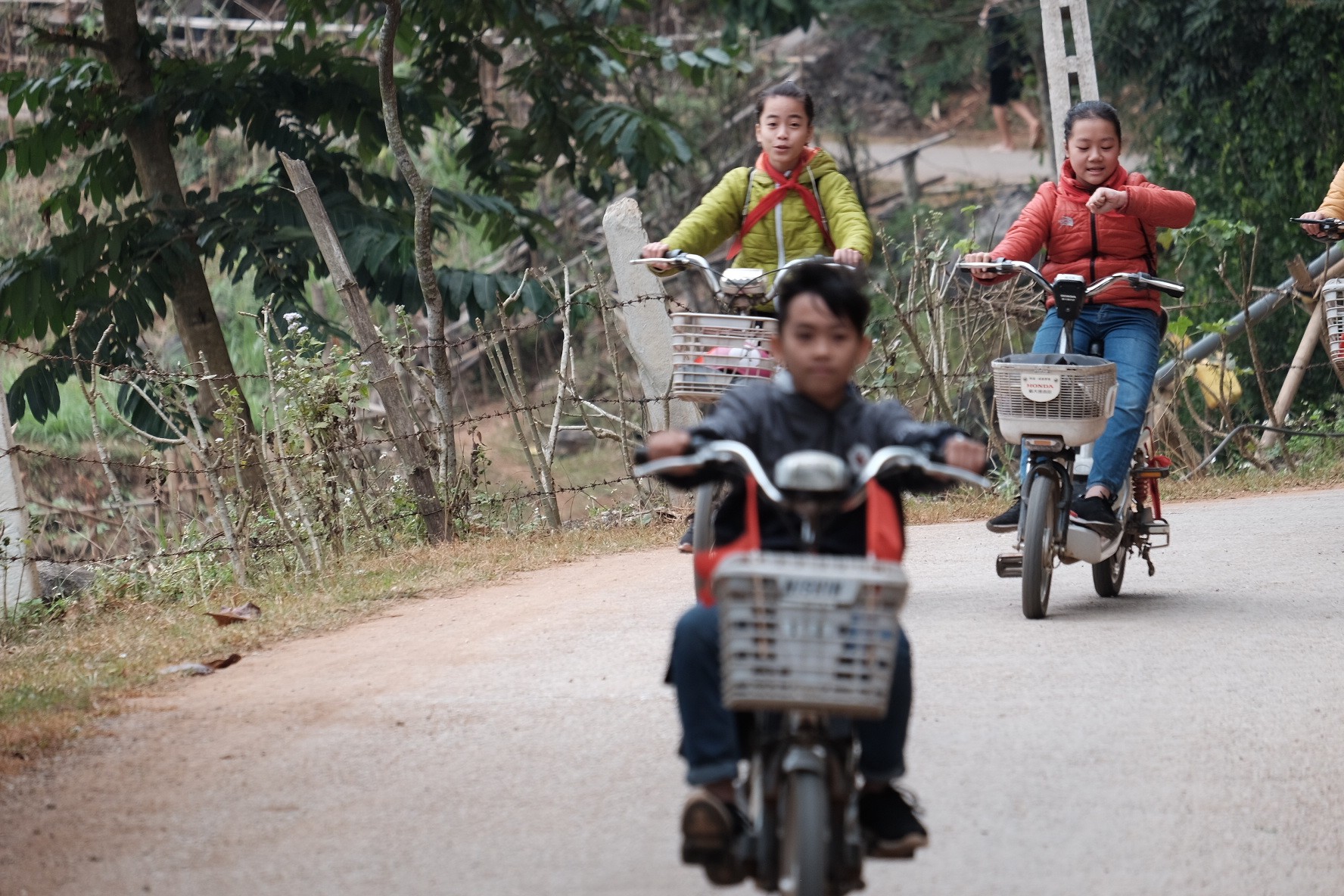 Smiling children in Vietnam ethnic village
Smiling children in Vietnam ethnic village
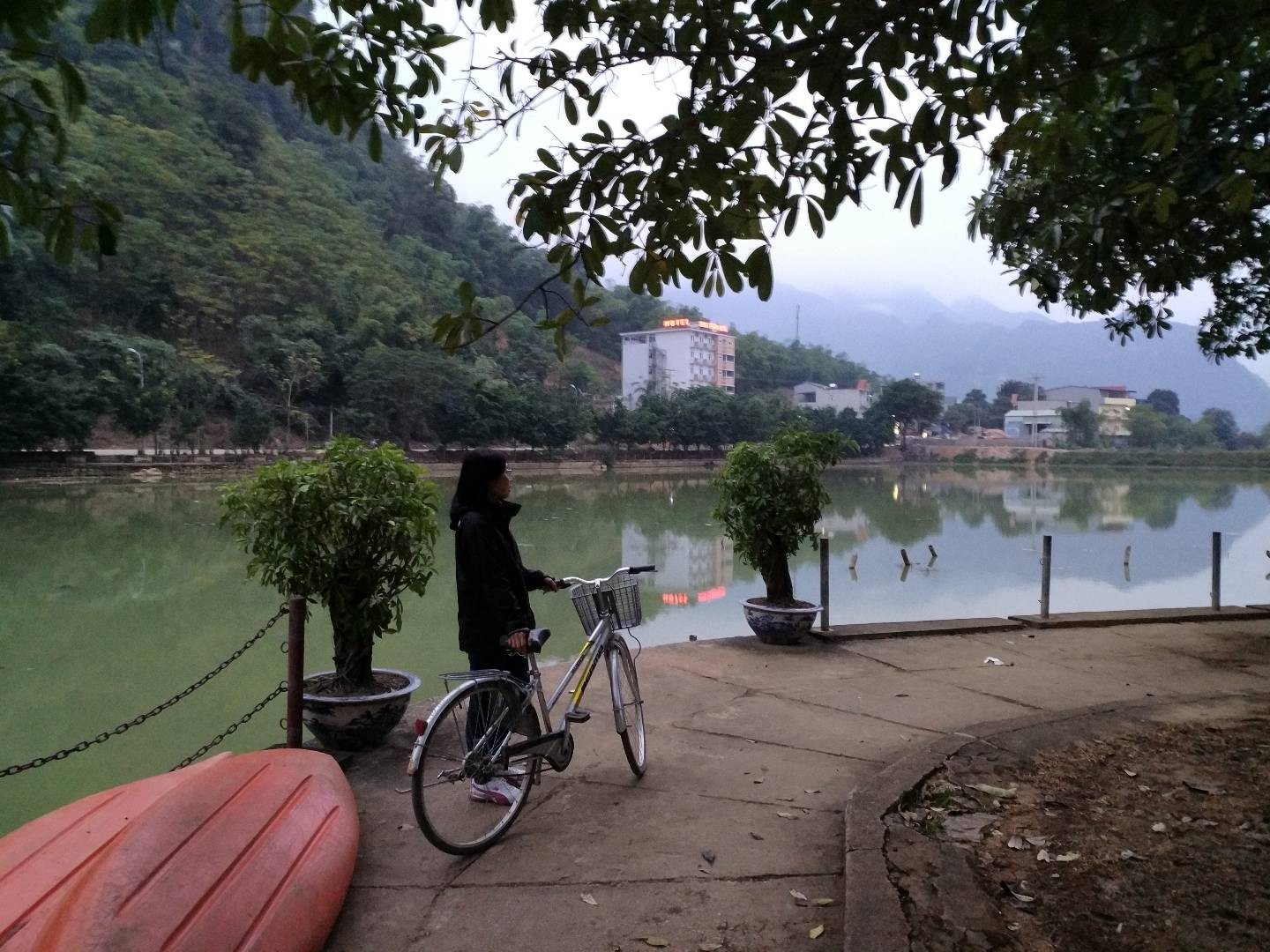 Sunset at Mu Luong Lake in Mai Chau
Sunset at Mu Luong Lake in Mai Chau
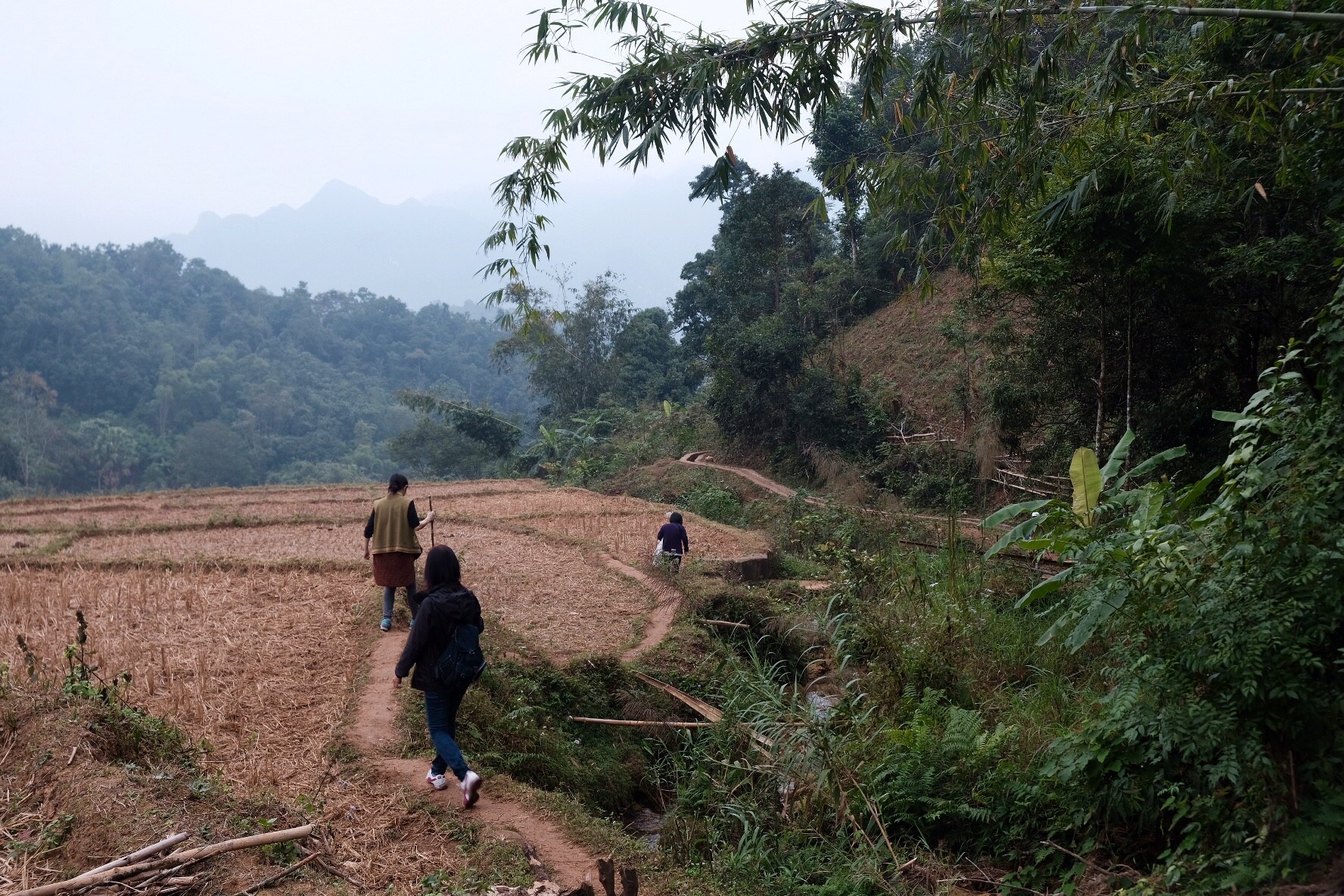 Hiking through terraced paddy fields in Mai Chau
Hiking through terraced paddy fields in Mai Chau
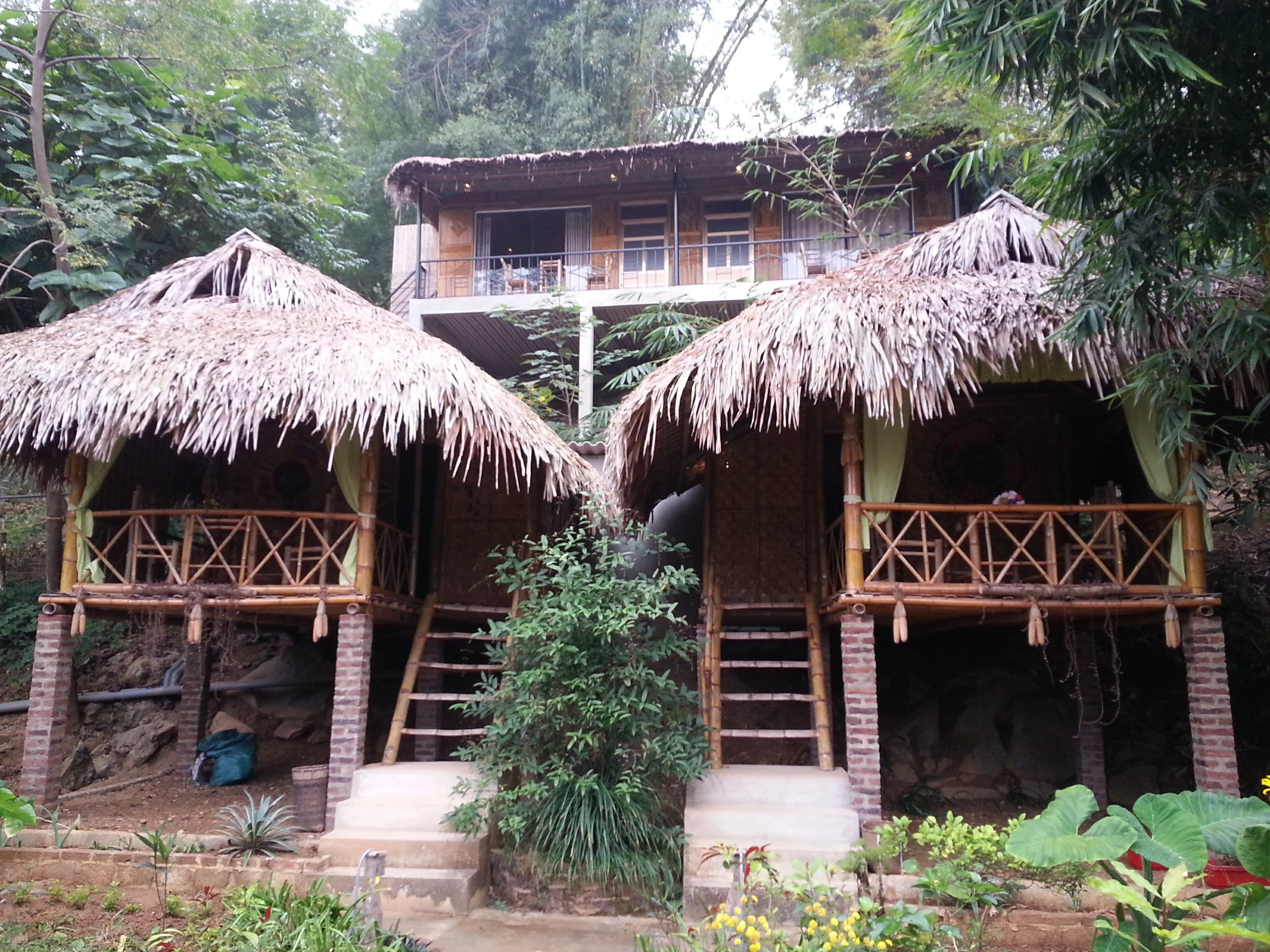 Typical Thai bamboo stilt house
Typical Thai bamboo stilt house
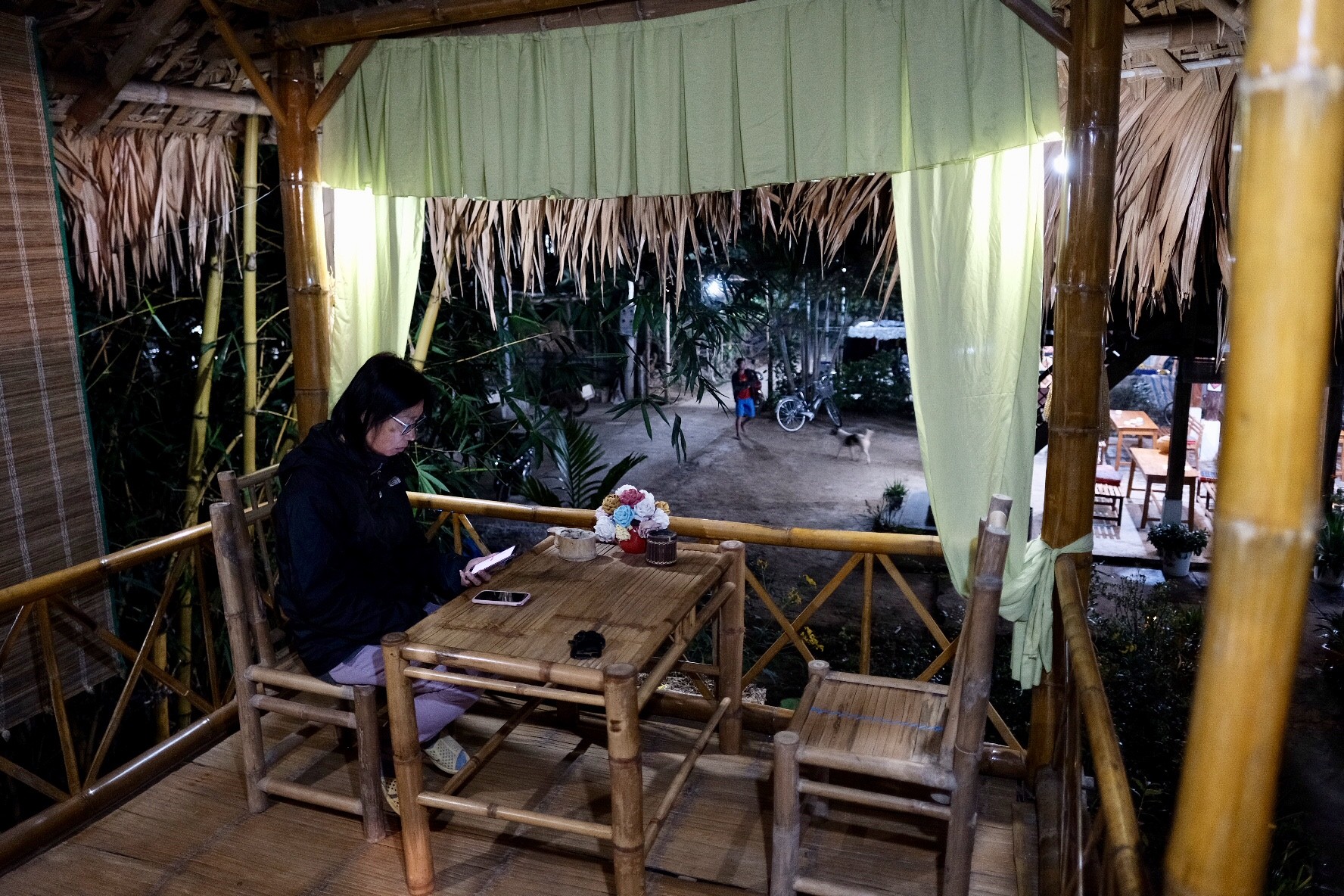 Bamboo hut with balcony in Mai Chau
Bamboo hut with balcony in Mai Chau
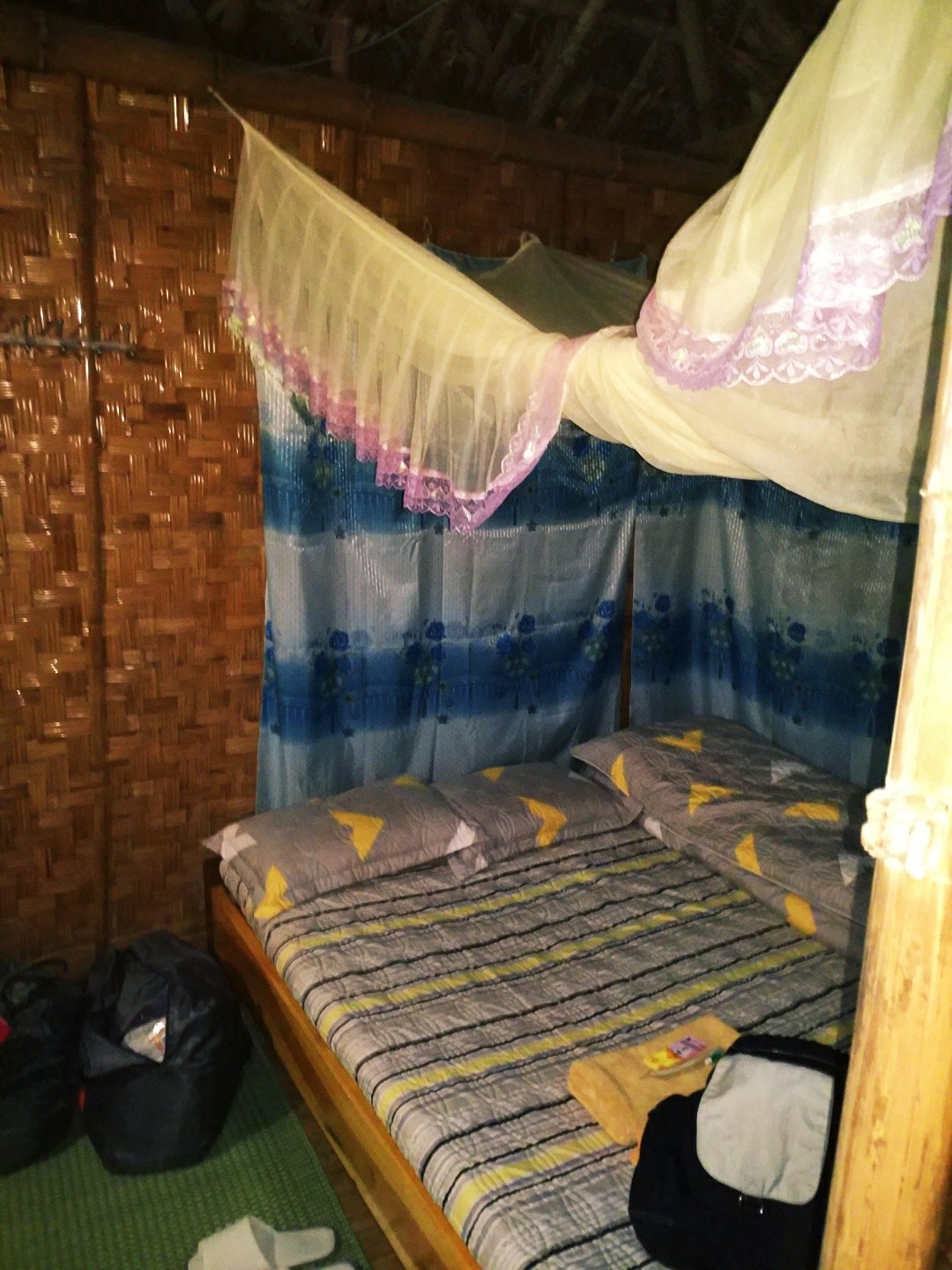 Comfortable bed in a Mai Chau homestay
Comfortable bed in a Mai Chau homestay
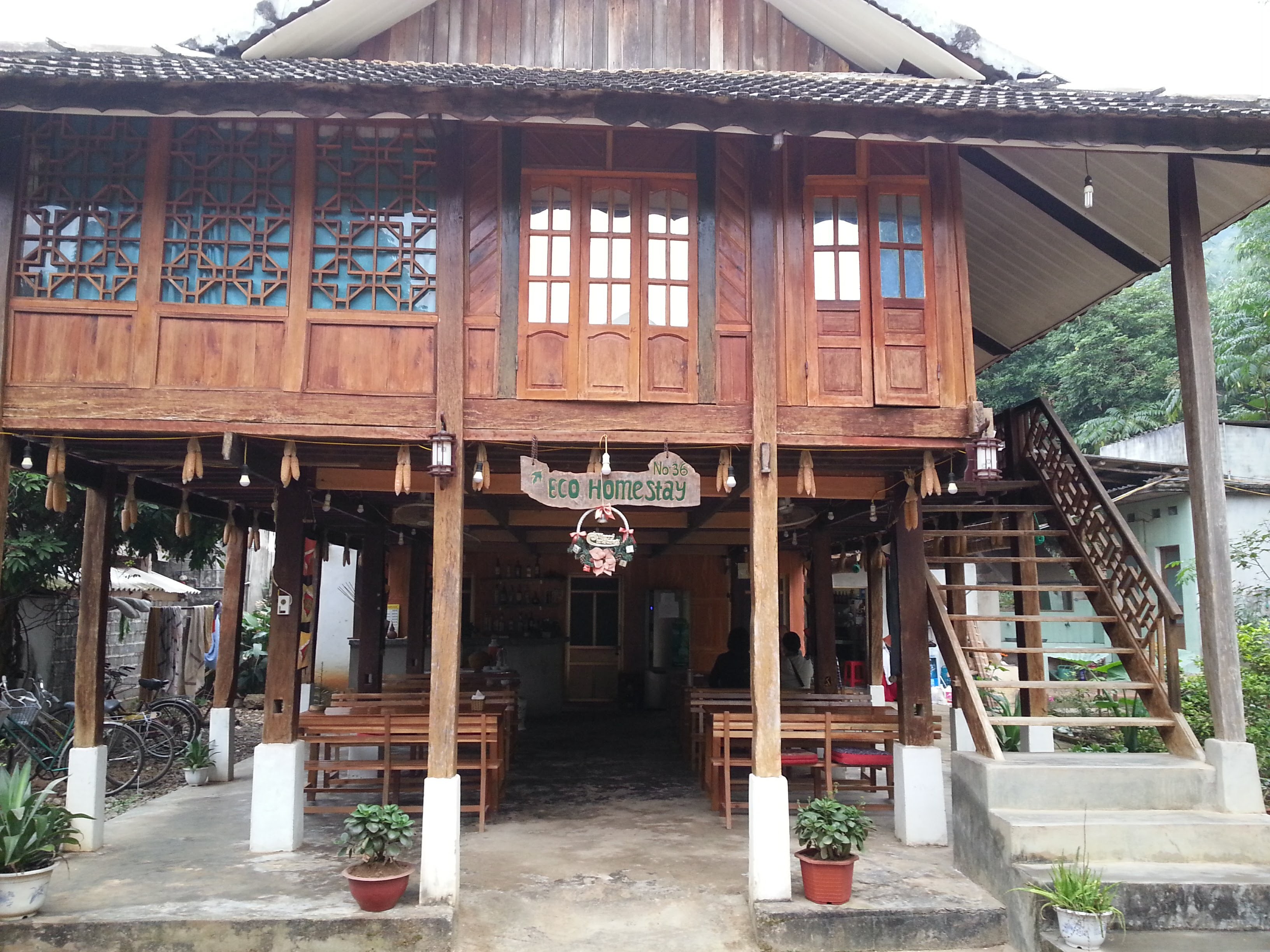 Dormitory above dining area in homestay
Dormitory above dining area in homestay



